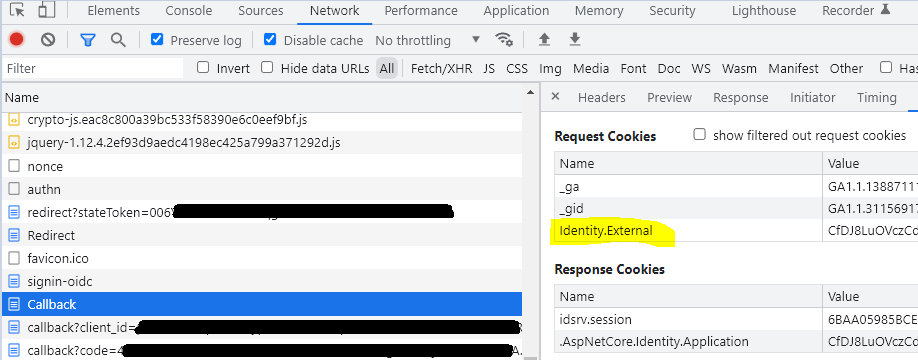I'm using OIDC with Identity Server 4 which is authenticating with Okta.
I'm calling var result = await HttpContext.AuthenticateAsync("Identity.External"); in a callback method.
I chose Identity.External as the scheme because I noticed that was the name of the cookie in the request to the callback method:

However, I realised I could rename this cookie using this code in Startup.ConfigureServices():
services.ConfigureExternalCookie(config =>
{
config.Cookie.Name = "test12";
});
But after renaming the cookie, the call to HttpContext.AuthenticateAsync("Identity.External") still works, so it appears that the scheme name has nothing to do with this cookie name.
How do we know what string value to put in there?
Is there a list of acceptable values somewhere?
Here's my Startup.ConfigureServices():
services.AddAuthentication(options =>
{
options.DefaultScheme = CookieAuthenticationDefaults.AuthenticationScheme; // "Cookies"
options.DefaultChallengeScheme = OpenIdConnectDefaults.AuthenticationScheme;
options.DefaultSignOutScheme = OpenIdConnectDefaults.AuthenticationScheme;
})
.AddCookie(CookieAuthenticationDefaults.AuthenticationScheme)
.AddOpenIdConnect("oidc", "OpenIdConnect", options =>
{
options.Authority = "oktaUrlHere";
options.ClientId = "clientIdHere";
options.ClientSecret = "clientSecretHere";
options.SaveTokens = true;
options.ResponseType = "code";
options.Scope.Add("groups");
options.Scope.Add("email");
options.Events = new CustomOpenIdConnectEvents
{
...
};
});
UPDATE:
I tried prepending the scheme with "1" just to see what would happen:
var result = await HttpContext.AuthenticateAsync("1Identity.External");
It returned this error which contains a list of registered schemes:
An unhandled exception occurred while processing the request.
InvalidOperationException: No authentication handler is registered for the scheme '1Identity.External'.
The registered schemes are: Identity.Application, Identity.External, Identity.TwoFactorRememberMe, Identity.TwoFactorUserId, idsrv, idsrv.external, Cookies, oidc. Did you forget to call AddAuthentication().Add[SomeAuthHandler]("1Identity.External",...)?
Are these schemes all registered by default?
Is this documented anywhere?
UPDATE:
I put a breakpoint in the following code to view the values for the properties on options:
services.AddAuthentication(options =>
{
options.DefaultScheme = CookieAuthenticationDefaults.AuthenticationScheme;
options.DefaultChallengeScheme = OpenIdConnectDefaults.AuthenticationScheme;
options.DefaultSignOutScheme = OpenIdConnectDefaults.AuthenticationScheme;
})
I can see the default value for DefaultAuthenticateScheme is Identity.Application, and the default value for DefaultSignInScheme is Identity.External.
Since options.DefaultAuthenticateScheme has a value, options.DefaultScheme ("Cookies") will not be used.
According to msdn, DefaultAuthenticateScheme is:
used as the default scheme by AuthenticateAsync(HttpContext, String).
If that's the case, why does the scheme passed to AuthenticateAsync() need to be the value for DefaultSignInScheme ("Identity.External") and not DefaultAuthenticateScheme ("Identity.Application")?
UPDATE:
In this Duende example, they use:
services.AddAuthentication()
.AddOpenIdConnect("AAD", "Employee Login", options =>
{
options.SignInScheme = IdentityServerConstants.ExternalCookieAuthenticationScheme;
// other options omitted
});
and authenticate using:
var result = await HttpContext.AuthenticateAsync(IdentityServerConstants.ExternalCookieAuthenticationScheme);
which also goes against what the Microsoft documentation says.


return Challenge(props, provider);which seems to be working fine. Is that the same as usingHttpContext.ChallengeAsync(OpenIdConnectDefaults.AuthenticationScheme)? – Interjacent